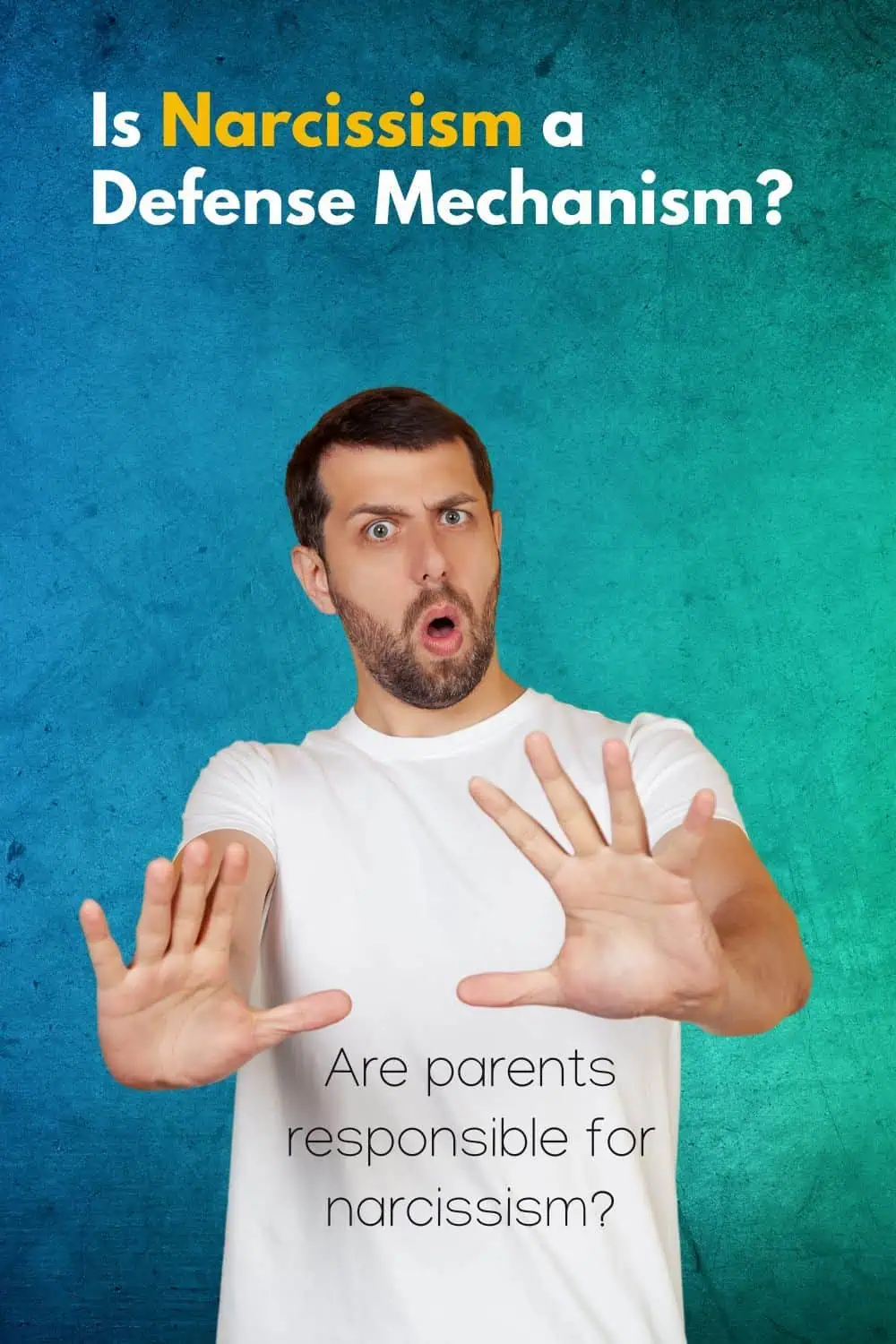Today's Tuesday • 7 mins read
— Reviewed by Dr. Sandip Roy.
Narcissism is a self-centered personality style that has increased over the past few years. But do narcissists act selfishly for some devious pleasure, or is narcissism a defense mechanism?
Narcissists create a larger-than-life image of themselves and fall in love with it obsessively.
Usually calm and composed, they are hypersensitive to criticism and become upset when someone challenges their self-image.
They take others for granted, either ignoring or exploiting their feelings, which those in their relationships find out sooner than later.
We are living in a narcissistic age.
– Luo, Cai, & Song, 2014
Is narcissism a defense mechanism?
- From a psychodynamic perspective, narcissism is seen as a defense mechanism people use to protect themselves from feeling not good enough or having low self-esteem.
- From a cognitive perspective, narcissism can be seen as a cognitive distortion that makes people believe they are more important (grandiosity) and more deserving (entitlement) than they really are.
In both cases, narcissism helps these people “defend” themselves against their self-loathing negative emotions and maintain a positive self-image.

Psychodynamic experts argue that narcissism develops as a defense mechanism to mask and shield low self-esteem, especially in vulnerable narcissists.
They argue that when a narcissistic parent refuses to love their child or ignores their attention needs, the child creates an unassailable narcissistic self-image.
Then the child imagines being unaffected by, or even mocking, or punishing, their offenders using this superman-like self-image.
Over time, narcissists develop at least 12 defense mechanisms, which help protect their egos.
Researchers Perry & Presniak (2014) observed these defenses in people with narcissistic personality disorders:
- Denial,
- Fantasy,
- Projection,
- Acting out,
- Idealization,
- Dissociation,
- Devaluation,
- Omnipotence,
- Rationalization,
- Self-image splitting,
- Projective identification.
[Defense mechanisms are our automatic psychological responses to anxiety, stress, and conflict (American Psychiatric Association, 1994).]

What causes someone to become a narcissist?
What causes narcissistic personality disorder? The exact causes of narcissism are not well understood, but experts believe that genetics, as well as the environment, may play roles in the development of narcissistic personality disorder (NPD).
Entitlement and grandiosity, traits that are strongly linked to NPD, can be inherited.
This study strongly suggested that both self-centeredness (23%) and entitlement (35%) are partly influenced by genetics, but they are also strongly affected by individual life experiences.
Interestingly, the genetic and environmental factors affecting these two parts of narcissism are mostly separate (92-93%), with only a small overlap (7-8%).
This suggests that self-centeredness and entitlement are inherited traits, but are also largely influenced by different genetic and environmental factors.
There is widespread consensus that narcissism typically emerges well before adulthood (Barry & Frick, 2003; Bardenstein, 2009; Thomaes & Bushman, 2009).
Environmental circumstances, such as adverse childhood experiences (ACE), may also have a role in the development of NPD.
A narcissistic defensiveness can often be linked to one or more traumatic life experiences when the person felt rejected, not “acceptable,” or not “good enough”.
However, not everyone who experiences difficult life experiences develops narcissistic traits or NPD.
Are parents responsible for making children into narcissists?
Two theories suggest how narcissism develops, and both are rooted in problematic parenting.
- One theory suggests that parents who excessively praise and spoil their children may be cultivating narcissistic tendencies in them (Imbesi, 1999; Millon, 1981). These children might come to believe that they are superior to others and rely on external validation to feel good about themselves.
- The other theory proposes that parental coldness and indifference can lead to children putting themselves on a pedestal to obtain the validation they crave but are not receiving from their parents (Kernberg, 1975; Kohut, 1977).
These theories suggest that the need for external validation in narcissistic adults stems from dysfunctional socialization experiences in their early years. Both of these theories have some empirical evidence, which is concerning.
Some narcissistic adults reported that their parents used to put them on a pedestal while also being indifferent toward them (Otway & Vignoles, 2006).
What are some common traits of narcissists?
A narcissist is a self-centered person who has an excessive preoccupation with oneself and one’s own needs, often at the expense of others.
Some common traits of a narcissist are an inflated ego, a lack of empathy, a need for attention, repressed insecurities, and few boundaries. They exude arrogance and toxic authority, are envious and exploitative, and demand constant praise and service.
They are addicted to fantasies of power and success and think excessively about their own needs and benefits. They believe they are more important than others and feel entitled to special treatment.
Their self-centeredness and lack of empathy for others make it hard for them to have long-term healthy relationships.
It is striking to see that narcissism involves two clusters:
- one with self-focused traits like superiority, and
- the other with relationship-focused traits like exploitativeness.
So, while they attach excessive importance and excellence to themselves, at the same time, they criticize and exploit others to feel superior.
Narcissists feel grandiose and act powerful, while also exhibiting a sense of entitlement, as if others exist solely to serve them.
In their belief that they are superior to others, they remain unaware of the harm they do to others.
Narcissism scores were positively related to dominance, exhibitionism, extraversion, self-esteem, and self-monitoring, among others; and negatively related to abasement, deference, and social anxiety.
— R A Emmons
While we all show narcissistic behavior occasionally, those with severe narcissism manipulate others to benefit themselves rather frequently.
How does narcissism affect adolescents?
It is distressing to know that narcissistic young people are more likely to get aggressive when threatened, mocked, or rejected.
Research shows a connection between narcissism and various types of aggression—physical, verbal, and relational (like excluding others and spreading rumors).
Furthermore, narcissism is also linked to aggression on the internet (Ang & Tan, 2011) and antisocial or delinquent behaviors, such as stealing and lying (Barry & Grafeman, 2007).
Moreover, research reveals that young adolescents who are both aggressive and narcissistic are more likely to remain aggressive over time (Bukowski & Schwartzman, 2009).
Another troubling aspect is the emotional roller coaster that these youths often experience. Research finds that narcissistic children are prone to “emotional extremes.”
That is, they experience intense positive emotions, like euphoria and pride, as well as intense negative emotions, like shame and anger, in their daily lives (Thomaes, 2008).
FAQs
Can overindulgence in childhood lead to narcissism?
Such parents often constantly praise their children for even small successes and lavish them with gifts when they fail.
Do we all have some narcissism in us?
Normal, healthy levels of narcissism, like self-confidence and self-respect, are acceptable and encouraged. However, the more extreme levels of narcissism, like highly selfish behavior or a mental illness like narcissistic personality disorder (NPD), pose major social issues.
What is the splitting defense mechanism in narcissism?
Such individuals cannot hold two opposing thoughts at the same time. Splitting helps them avoid feeling uncomfortable when faced with both positive and negative aspects or qualities, by allowing them to keep good and bad separate, and perceive themselves as all good or all bad.
Splitting protects their sense of self, but can also lead to unstable relationships since they cannot accept the complexity of situations or people.
Final Words
Finally, it is disheartening to think that parents may unknowingly nurture their child’s narcissism.
Children need to be taught how to develop relationships, self-esteem, and emotional regulation that are non-narcissistic and healthy.
My therapeutic experience has shown me that healthy parenting can tackle narcissism early on, preventing future harm to a child’s self-image and behavior.
√ Also Read: 20 Signs of A Narcissist: Red Flags of Narcissism
√ Please spread the word if you found this helpful.
• Our Story!
